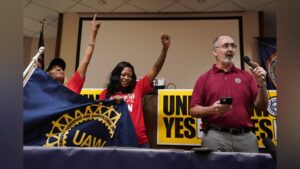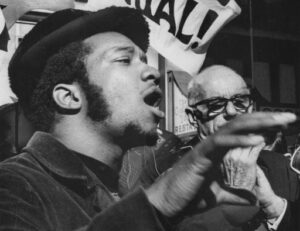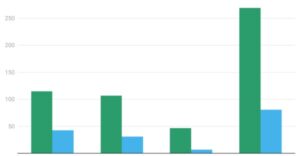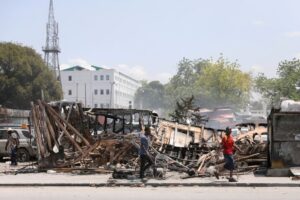We translate and reprint here an analysis of the results of the first round of the Brazilian elections, held October 2. The election resulted in an October 30 runoff between former president Luis Ignazio da Silva (“Lula”) of the center-left Workers Party and the incumbent, far right president Jair Bolsonaro. The result defied polls, and expectations from many of Lula’s supporters, that Lula would win outright in the first round. This analysis, by Marxist historian Marcelo Badaró Mattos, explains why the left was wrong and what will be needed to defeat Bolsonaro at the polls on October 30. This article originally appeared on the Brazilian Website Esquerda Online and was translated to Spanish and republished by Correspondencia dePrensa.
The first round in the 2022 general elections brought a bitter surprise to the left that had, following the opinion polls, expected either a first-round electoral victory for Lula, or a closely decided run-off election with Lula holding a wide advantage over Bolsonaro.
We have to learn some immediate lessons because our challenge is enormous in the coming weeks. Electing Lula and defeating Bolsonaro, we now know, will be more difficult and—for that very reason, more vital.
Where we went wrong
The first lesson, obvious but still difficult to understand, is that“optimism of the will” can never replace realism in analysis. The social strength of the neo-fascist Bolsonaro movement (as well as Bolsonaro’s vote compared to the first round in 2018) has grown and solidified. The impressive stability of Bolsonaro’s electoral support of about a third of the electorate, despite ups and downs, observed in the polls throughout his term—despite the sickening trail of destruction and death in those four years—is the strongest indicator of this. Moreover, Lula’s rise in the polls led us to underestimate the continuing strength of “anti-PTism” (opposition to the Workers Party) that manifests itself in wide layers of society, especially in the center and south of the country. This “anti-PTism” is still capable of encouraging a “lesser evil”vote for Bolsonaro, as we saw in São Paulo and Rio de Janeiro, where Bolsonaro’s vote was much higher than pre-election polls showed.
The second lesson is that electoral polls should be read not only mathematically, but in light of deeper political and social dynamics, understanding that a poll represents a snapshot in time. Superficially, the polls called Lula’s vote correctly (within the margin of error), as well as Simone Tebet’s [the centrist Brazilian Democratic Movement’s candidate,who won about 4 percent of the vote in the first round], exceeding the vote of the center-left candidate Ciro Gomes. The polls were much less accurate on predicting Bolsonaro’s vote and much more accurate with Ciro’s vote. Clearly, there was a migration of most of Ciro’s votes to Bolsonaro—which our aforementioned optimistic illusion did not grasp, since it insisted on characterizing that this vote would go to Lula—driven more by a center-left perspective—when anti-PTism was his main appeal. But this alone would not explain Bolsonaro’s vote.
It is easy to see that the extreme right, around the world, has often had a stronger election day result than pre-election polls showed. One could speculate that a mixture of “bashful” voting(not admitting to planning to vote for Bolsonaro) and “self-fulfilling prophecy” (“If I believe the polls lie, I won’t tell you the truth”) explains it. But, at least in the specific case of Brazil (and in the United States, analyses of the Trump vote shows something similar), it is a fact that the polls captured a majority of votes for Lula in the lower income strata of the population and the opposite in relation to Bolsonaro. The lower income strata are, historically, those who abstain the most in elections. They are internal migrants who never established a stable voting address. Or they do not have the resources to pay for transportation to the polling places. [In large cities, especially in the megalopolises of the southeast, these distances can be great, due to changes of residence throughout their lives.]Sectors in which the daily struggle to survive can be so hard that it completely disconnects life from the national political calendar and the exercise of political citizenship. Abstention in this first round was 20.95 percent of the electorate, the highest in the last 20 years. Polls cannot adequately weight this factor.
Neither can they capture a last-minute shift—positive by persuasion, or negative by intimidation—driven by family pressure, in the neighborhood, at work, etc. Except for the Northeast (and even in that region with many mediations), the molecular growth of electoral support for Lula in the last weeks didn’t have the public visibility with t-shirts, flags and street crowds. Meanwhile, the green-and-gold clad Bolsonaro supporters were visible and intimidating. This may have had an impact in the final stretch that the polls didn’t register. The intimidation and fear of political violence, imposed by the more openly neo-fascist face of Bolsonarismo, had the effect of limiting the visibility of support for Lula, especially in the Southeast. Many people voted for Lula as an act of silent resistance. Silent resistance is not enough to bolster those who suffer greater coercion, nor to give the certainty of “being in the right boat” to the undecided who—astonishingly—still exist.
We cannot make any more mistakes
Against this backdrop, the first lesson we must learn from this first round is to shed any self-deluding optimism, such as the messages about the growth of left-wing caucuses in the House of Representatives and state legislatures, that has circulated in our bubble since the first round. There may be growth relative to the left’s minority status, but it hardly represents any decisive shift. On the opposite side, the Centrão bench (parliamentarians and right-wing parties for hire) has grown in the House, as expected by the obscene electoral use of the so-called “secret budget” (corrupt presidential bribes to lawmakers). In the Senate, boosted by the election of the current vice-president and his former ministers, Bolsonaro’s support has grown enough to advance an impeachment against the STF (Supreme Federal Court) ministers, if Bolsonaro is re-elected. For the left party candidates who won—and no doubt they have—their first litmus test will be to keep the mobilization that won their posts in the streets, to elect Lula in the second round, no matter what.
As much or more self-deceiving is the optimism of the mathematical calculations that ignore political and social struggle: “Lula got six million more votes”, “Lula only needs 2 percent more of the electorate to win” and other similar self-consoling phrases. Bolsonaro pulled out the vote in the first round’s final stretch to close the gap with Lula. He may have even more “reserve funds”, from those who voted for Tebet or Ciro in the first round, to those who didn’t vote for president in the first round. Will we finally learn, once and for all, that the campaign of a neo-fascist does not move according to the enlightened paths of the “rules of the game” of this “democratic party,”as the pundits constantly insist?
For this same reason, the “institutionalist”thinking that has so far dominated the leadership of the PT campaign—that it is enough to add mainstream party endorsements to a broad electoral front—could be disastrous in this second round. That isn’t to say that we won’t be able to do it. These parties have already elected their deputies, the MDB [Tebet’s party] is only fighting for two state governments in the second round (the PDT [Gomes’s party] is not even close) and, in such a polarized race, they are unlikely to enthusiastically embrace Lula. Even if they do, nothing will guarantee that Lula will gain their voters’ support. In fact, Ciro’s deflation in the first round would suggest the opposite. It is also useless to have more high-profile meetings with these“champions of economic growth”. They have no veto, but neither do they have any votes to offer Lula. The most organic party that the Brazilian bourgeoisie built in the New Republic, the PSDB [the Brazilian Social Democratic Party, the party of former president Fernando Henrique Cardoso] bowed to Bolsonarismo and sank. With the defeat of its candidate for governor in São Paulo, its last institutional bastion fell.
The main lesson from the results of the first round is this: to defeat Bolsonaro electorally on October 30, it will be necessary for the people in the streets, with Lula, to transform the current electoral majority into a wave of popular support, visible and expressive enough to drag to the polls some those who abstained in the first round, to attract the uncorrupted voters for other candidates and to ensure the confidence of those shamed and threatened by neo-fascist intimidation that it is possible to defeat Bolsonaro.
It will be necessary to push Lula in front of the crowd, as on the slopes of Salvador, to bounce back amid the masses, as in the streets of São Paulo, transforming the next four weeks into the most intense process of socio-political mobilization of recent times. Although the coordination of his campaign continues to bet on agreements from above with the party leadership and representatives of the bourgeoisie, it is necessary to push the campaign in the direction of the street. A new “EleNão!” [a women-led 2018 mass protest movement against Bolsonaro, under the slogan meaning “Not Him!”] will have to emerge. The decisive vote will come from widening Lula’s advantage where it already exists: in the poorest sectors of the working class, among the women, among Afro-Brazilians, among the youth, and in the northeast.
Because our future depends on it, and because we owe it to the memory of the nearly 700,000 victims of the pandemic; to those who die in the daily police massacres, turned into political propaganda by the militia rulers; and to the millions who go hungry.
“The only fight that is lost is the one that is abandoned. We are not going to abandon that one anymore.”
Marcelo Badaró
Marcelo Badaró Mattos is Full Professor of Brazilian History at Universidade Federal Fluminense, Brazil. He is the author and editor of a number of books, including Trabalhadores e sindicatos no Brazil (Workers and Trade Unions in Brazil; second edition, 2009) and E. P. Thompson e a tradição de críticaativa do materialismohistórico ( E. P. Thompson and the Tradition of Active Critique of Historical Materialism; 2012).




